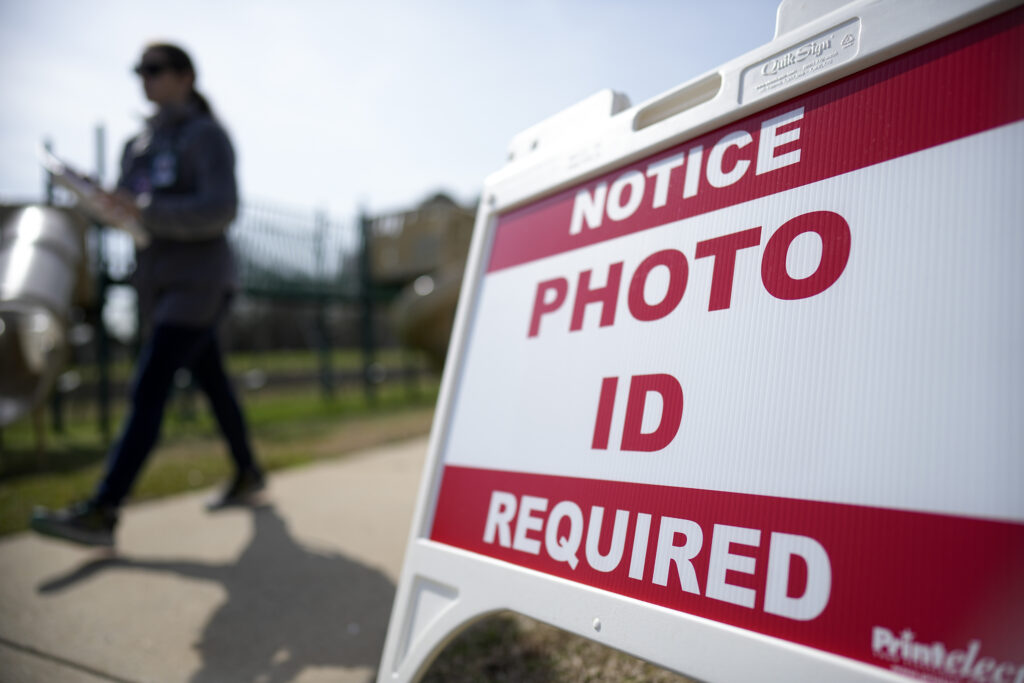Federal Trial To Begin in Challenge to North Carolina Photo ID Law
WASHINGTON, D.C. — Trial begins Monday in a federal case that will determine whether North Carolina’s law requiring voters to show photo IDs violates the Voting Rights Act and the U.S. Constitution.
The state legislature passed Senate Bill 824 on Dec. 19, 2018, overriding Gov. Roy Cooper’s (D) veto, which mandates that people voting in-person or via mail present an approved form of photo ID. The list of approved forms of identification includes a driver’s license, passport, voter ID issued by a county board of elections, tribal ID, student ID from a college or university and military ID.

The North Carolina State Conference of the NAACP filed a lawsuit against the State Board of Elections a day later, arguing that the legislation disproportionately burdens Black and Latino residents in the state in violation of Section 2 of the Voting Rights Act and the 14th and 15th Amendments of the U.S. Constitution.
Section 2 of the Voting Rights Act of 1965 bans voting laws, practices or maps that curtail or take away someone’s right to vote due to their race. This section is often used to challenge laws that have a discriminatory impact.
According to the NAACP’s trial brief filed on April 16, Black voters are twice as likely as white voters to lack a valid form of ID, and Latino voters are at least 50% more likely to not have ID.
In the filing, the NAACP claims that there are numerous reasons why it is harder for minority voters to obtain an ID, including documentation requirements, fees, travel to departments of motor vehicles or county board of elections offices and limited business hours or availability of these offices.
“These burdens are disproportionately borne by minority voters, who also lack the resources to overcome them,” according to the NAACP’s filing.
The NAACP also argued that “the enactment of S.B. 824 was merely one of a series of racially discriminatory attacks on voting by the [state] legislature over the last decade.”
The State Board of Elections argues in an April 15 trial brief that a new voter ID law is not “‘fatally infected’ by the unconstitutional discrimination of a past voter-ID law that has been struck down.”
The board also added that provisions in the law allow people to cast votes without an ID by completing a “Photo ID Exception Form,” and indicating the reason they need to cast provisional ballots (lack of transportation, lack of birth certificate and other documents, etc). Voters can also cast a provisional ballot and return later to the county board with an acceptable form of ID before the day leading up to the canvass of votes.
The board argues that due to these provisions, “the burdens imposed by the law on voters who lack identification are minimal at best.”
The U.S. District Court for the Middle District of North Carolina preliminarily blocked the law on Dec. 31, 2019, but the 4th U.S. Circuit Court of Appeals reversed the decision in December 2020.
Amidst this litigation, Republican legislators also sought to get involved in the case multiple times.
One of the points that GOP lawmakers bring up in their April 15 trial brief is that S.B. 824 received bipartisan support in the legislature, and one of the primary sponsors of the bill was State Sen. Joel Ford, an African American Democrat, who served in the state Senate until 2019.
A 2022 order from the U.S. Supreme Court allowed the legislators to join state election officials in the lawsuit, so they will be involved in next week’s trial.
Monday’s trial, however, will not be the first time that this law will be put to the test in court.
In December 2022, in a state-level lawsuit filed by a group of voters represented by the Southern Coalition for Social Justice, the North Carolina Supreme Court permanently blocked the law.
After the court flipped to a Republican majority following the 2022 midterm elections, the justices reheard the case and overturned the decision in April 2023.
After the high court’s flip flop, the impacts of the law were seen in the state’s March 4 primary election. Out of 1.8 million voters, 477 did not have their ballots counted, which is one in 3,774 voters, according to the trial brief from state election officials.
The outcome of next week’s trial could determine whether North Carolina voters need to present photo IDs to vote in the upcoming 2024 election.